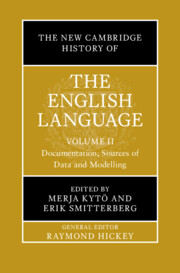Book contents
- The New Cambridge History of the English Language
- The New Cambridge History of the English Language
- The New Cambridge History of the English Language
- Copyright page
- Contents
- Figures
- Tables
- Contributors to Volume II
- General Preface
- Abbreviations for Corpora and Other Electronic Resources
- General Editor’s Introduction
- Introduction to Volume II
- Part I The Textual Record
- Part II Lighthouse Works and Authors
- Part III Genre and Medium in the Record
- Part IV Modelling the Record: Methods and Theories
- Appendix: List of Corpora and Other Electronic Resources
- Index
- References
General Editor’s Introduction
Published online by Cambridge University Press: 18 October 2025
- The New Cambridge History of the English Language
- The New Cambridge History of the English Language
- The New Cambridge History of the English Language
- Copyright page
- Contents
- Figures
- Tables
- Contributors to Volume II
- General Preface
- Abbreviations for Corpora and Other Electronic Resources
- General Editor’s Introduction
- Introduction to Volume II
- Part I The Textual Record
- Part II Lighthouse Works and Authors
- Part III Genre and Medium in the Record
- Part IV Modelling the Record: Methods and Theories
- Appendix: List of Corpora and Other Electronic Resources
- Index
- References
Summary
The New Cambridge History of the English Language is aimed at providing a contemporary and comprehensive overiew of English, tracing its roots in Germanic and investigating the contact scenarios in which the language has been an active participant.
Keywords
Information
- Type
- Chapter
- Information
- The New Cambridge History of the English LanguageDocumentation, Sources of Data and Modelling, pp. 1 - 13Publisher: Cambridge University PressPrint publication year: 2025
References
Accessibility standard: WCAG 2.0 A
Why this information is here
This section outlines the accessibility features of this content - including support for screen readers, full keyboard navigation and high-contrast display options. This may not be relevant for you.Accessibility Information
Content Navigation
Allows you to navigate directly to chapters, sections, or non‐text items through a linked table of contents, reducing the need for extensive scrolling.
Provides an interactive index, letting you go straight to where a term or subject appears in the text without manual searching.
Reading Order & Textual Equivalents
You will encounter all content (including footnotes, captions, etc.) in a clear, sequential flow, making it easier to follow with assistive tools like screen readers.
You get concise descriptions (for images, charts, or media clips), ensuring you do not miss crucial information when visual or audio elements are not accessible.
Visual Accessibility
You will still understand key ideas or prompts without relying solely on colour, which is especially helpful if you have colour vision deficiencies.
Structural and Technical Features
You gain clarity from ARIA (Accessible Rich Internet Applications) roles and attributes, as they help assistive technologies interpret how each part of the content functions.
